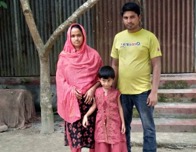Pictured: Aleya and Moniruzzaman with their daughter
Development occurs through the compound effect of change, both small and large. It’s hard to see this sometimes, discussion on ‘development’ often presents either a statistical view (presenting people’s lives as numbers and data) or discusses the macro view (institutional change and big picture thinking). Development discussions are often future focused and for good reason, it is wonderful and important to work towards goals which go beyond just breaking the cycle of poverty.
But as a development organisation we should also celebrate how different someone’s daily life is because of small changes which multiply over time.
Aleya and Moniruzzaman
When Aleya and Moniruzzaman first got married, Moniruzzaman was working at other people’s shops which only gave a small amount of income. Aleya stayed home alone, her early marriage meant she had not finished her formal education and was limited to contributing to household chores. Their home was not comfortable, they had no sanitary latrine and they had to collect safe drinking water from a neighbour’s tube well. It was challenging to manage these issues with living expenses and it all became increasingly difficult when their daughter was born.
Kokali Mohila Samity
Aleya joined the Kokali Mohila Samity (group) connected to the Symbiosis integrated community development project in Tangail. On joining the samity, Aleya started to give Tk. 5 (0.073 AUD) in savings every week. She received training in income generation, and continued to contribute to her savings weekly – over time amassing Tk. 13,788 (200 AUD). Aleya was able to connect through the Symbiosis network with Polash, a local CBO, and was approved for a Tk. 50,000 (730 AUD) loan to start a small shop.
From that loan, Aleya and Moniruzzaman together now run that very shop. The loan meant Moniruzzaman no longer needed to leave home to find work with other shops. They built the shop adjoining their home creating ease of daily management and they are able to care for their young daughter together. Their shop provides a daily income of Tk. 800-900 (12 AUD) and Aleya is paying back the loan . Aleya now contributes Tk. 50 (0.73 AUD) every week back into her samity. They have extra finances which can be invested back into their lives and family.
Imagining a day in the life
We can’t know every decision Aleya and Moniruzzaman will make since our field team spoke with them but we do know the following.
- Moniruzzaman is no longer working at other people’s shops, he has his own and it adjoins his house. He has more control over his time.
- Aleya is no longer home alone, she has an education, she has work and her husband is home more often with her and their daughter.
We can’t know how they will invest their finances but perhaps they will choose to make a more comfortable home, install a sanitary latrine or safe drinking water.
Any one of these changes would also completely change their usual day.
But the most overwhelming change we can see in their day is the power of choice. By making one choice, to learn and save through the Kokali Mohila Samity, Aleya and Moniruzzaman now have so many more choices in their daily lives.
This story was collected by the Integrated Community Development project Tangail which is led by Project Manager Salma.
